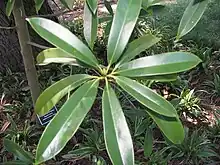| Magnolia fordiana | |
|---|---|
 | |
| At the United States National Arboretum | |
| Scientific classification | |
| Kingdom: | Plantae |
| Clade: | Tracheophytes |
| Clade: | Angiosperms |
| Clade: | Magnoliids |
| Order: | Magnoliales |
| Family: | Magnoliaceae |
| Genus: | Magnolia |
| Species: | M. fordiana |
| Binomial name | |
| Magnolia fordiana | |
| Synonyms[2] | |
|
List
| |
Magnolia fordiana is a widespread species of flowering plant in the family Magnoliaceae, native to southern China, Hainan, and Vietnam.[2] An evergreen tree reaching 25 m (82 ft) tall, it is found in hilly forests, often beside rivers, at elevations from 300 to 1,200 m (1,000 to 3,900 ft).[3] Specialists in Magnolia believe that most Magnolia fordiana specimens offered for sale are actually the closely related Magnolia yuyuanensis, a more attractive tree and one that is better adapted to cultivation.[4] It is widely used as a street tree in southern Chinese cities.[5]
Subtaxa
The following varieties are accepted:[2]
References
- ↑ Khela, S. (2014). "Vang Tam Magnolia fordiana". IUCN Red List of Threatened Species. 2014: e.T62600A3116535. doi:10.2305/IUCN.UK.2014-1.RLTS.T62600A3116535.en. Retrieved 4 August 2023.
- 1 2 3 "Magnolia fordiana (Oliv.) Hu". Plants of the World Online. Royal Botanic Gardens, Kew. Retrieved 4 August 2023.
Magnolia inodora DC. in Syst. Nat. 1: 459 (1817), tentatively listed as a synonym
- ↑ "18. Manglietia fordiana Oliver, Hooker's Icon. Pl. 20: t. 1953. 1891. 木莲 mu lian". Flora of China. efloras.org. 2023. Archived from the original on 7 December 2021. Retrieved 4 August 2023.
- ↑ Sutton, Julian (2022). "Magnolia fordiana (Oliv.) Hu". Trees and Shrubs Online. International Dendrology Society. Archived from the original on 29 March 2023. Retrieved 4 August 2023.
- ↑ Ossola, Alessandro; Hoeppner, Malin J.; Burley, Hugh M.; Gallagher, Rachael V.; Beaumont, Linda J.; Leishman, Michelle R. (2020). "The Global Urban Tree Inventory: A database of the diverse tree flora that inhabits the world's cities". Global Ecology and Biogeography. 29 (11): 1907–1914. doi:10.1111/geb.13169. S2CID 225429443.
This article is issued from Wikipedia. The text is licensed under Creative Commons - Attribution - Sharealike. Additional terms may apply for the media files.
